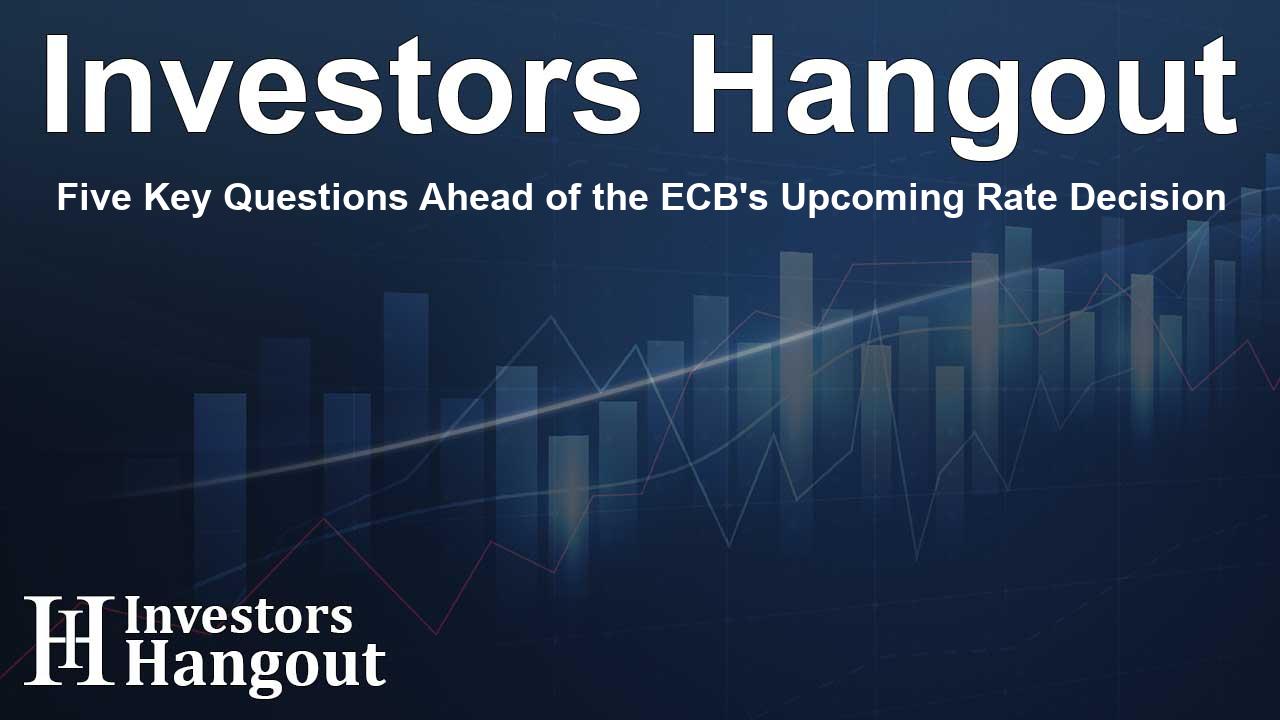Five Key Questions Ahead of the ECB's Upcoming Rate Decision

Understanding the ECB's Upcoming Decisions
The European Central Bank (ECB) is poised to make a crucial decision regarding interest rates. The likelihood of another rate cut this Thursday is high, but economic sentiment among policymakers remains mixed. This scenario brings forth several important questions that will influence market expectations and investor strategies.
What Action Will the ECB Take This Thursday?
Financial experts generally agree that a 25 basis point cut in the ECB's deposit rate is on the horizon. Investors are particularly interested in any signals about future actions that may follow this adjustment. Since the last meeting, the market has fully anticipated another cut, with expectations of a further revision as soon as December. Additionally, investors are considering the chance of another cut in October, which will largely depend on comments from ECB President Christine Lagarde regarding the central bank's future strategies.
Market Anticipation and ECB Guidance
Given the current economic landscape, it is essential to pay attention to Lagarde's statements that may provide insights into the ECB's future actions. Experts warn that while a rate cut appears likely, the ECB’s commitment to a data-driven approach means that any subsequent decisions could still be adjusted based on new information.
Can the ECB Relax Its Focus on Inflation?
There are signs that inflation pressures may be easing, potentially allowing the ECB to shift some focus away from inflation concerns. Recent data indicates that inflation is approaching the ECB's 2% target, currently at 2.2%, while wage growth seems to be decelerating.
Evaluating Inflation Trends and Economic Growth
The economy is still in a slow recovery phase, particularly in regions like Germany, which faced contraction in the second quarter. In light of these conditions, some policymakers are hesitant about aggressive rate cuts that could drive inflation below acceptable levels. Economists suggest that while disinflation trends are emerging, they are primarily linked to energy and goods prices, suggesting that the ECB has an opportunity to gradually cut rates.
What Will the ECB's Updated Projections Reveal?
As the ECB's outlook develops, it is likely that they will lower their economic growth projections while possibly raising their core inflation estimates slightly. However, this adjustment may not significantly change the long-term perspective, where inflation is expected to return to the 2% target by late 2025, despite short-term fluctuations.
The Impact of a Strong Euro on Inflation
The recent surge of the euro, reaching levels not seen in over a year, prompts questions about its effects on inflation control. While a stronger currency can theoretically help lower inflation, substantial and sustained movements would be necessary to create a meaningful impact.
What Are the Implications of the ECB's Rate System Changes?
The ECB has introduced a new liquidity framework aimed at effectively managing the large amounts of cash currently circulating in the financial system. This change includes lowering the premium on borrowing at weekly cash auctions, with the goal of stabilizing money markets and supporting interbank lending while ensuring liquidity within the banking sector.
Future Expectations and Market Dynamics
As these changes are implemented, it will take time for their effects to be felt, especially considering the current excess liquidity in the market compared to past borrowing levels. Investors are keen for more information on the ECB's long-term strategies regarding loan frameworks and bond purchasing, which will ultimately influence market structure in the coming years.
Frequently Asked Questions
What does the ECB's rate cut mean for consumers?
A rate cut typically signals lower borrowing costs, which can be advantageous for consumers looking for loans or mortgages.
How does the ECB's decision affect inflation?
Rate cuts can encourage spending, which may influence inflation rates by increasing demand.
When will the ECB update its economic projections?
The ECB usually revises its projections during its scheduled meetings, which occur regularly throughout the year.
Why is a strong euro considered beneficial for the economy?
A stronger euro can help reduce the prices of imported goods, potentially alleviating inflationary pressures.
What does liquidity management entail for the ECB?
Liquidity management ensures that banks maintain adequate cash flow while preventing excessive inflation by controlling the money supply.
About The Author
Contact Henry Turner privately here. Or send an email with ATTN: Henry Turner as the subject to contact@investorshangout.com.
About Investors Hangout
Investors Hangout is a leading online stock forum for financial discussion and learning, offering a wide range of free tools and resources. It draws in traders of all levels, who exchange market knowledge, investigate trading tactics, and keep an eye on industry developments in real time. Featuring financial articles, stock message boards, quotes, charts, company profiles, and live news updates. Through cooperative learning and a wealth of informational resources, it helps users from novices creating their first portfolios to experts honing their techniques. Join Investors Hangout today: https://investorshangout.com/
The content of this article is based on factual, publicly available information and does not represent legal, financial, or investment advice. Investors Hangout does not offer financial advice, and the author is not a licensed financial advisor. Consult a qualified advisor before making any financial or investment decisions based on this article. This article should not be considered advice to purchase, sell, or hold any securities or other investments. If any of the material provided here is inaccurate, please contact us for corrections.
